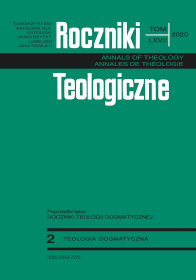A Theological Perspective on the Phenomenon of Life: Introduction into the Bios, Psyche, and Zoe
Abstract
Life is such a beautiful and unique phenomenon. It cannot be described by a single definition, as it manifests itself in many different ways. Therefore, the phenomenon of life must be captured as a whole and by including its essential planes. The authors of the paper did interdisciplinary research. Their task was an exploration of the issue of life on three planes: bios (life in its core manifestations), psyche (intelligent and conscious life), and zoe (life that transcends itself). The collected data gives an appropriate perspective for theological insight. This approach determines a methodology that is interdisciplinary and very theological in character. This in-depth perspective enables the whole phenomenon to be understood in its transcendental function. Life from its very inception emerges toward “something more.” The final goal of this transcendental dynamism is ever-living God.
References
Balmer, Adam. “Transcendent Reality and the Consciousness Problem.” Journal of Philosophy of Life 7/1(2017): 1–15.
Barbieri, Marcello. ‘What is code biology?’ Bio Systems 164(2018): 1–10.
Cohen, Irun R. ‘Updating Darwin: Information and entropy drive the evolution of life.’ F1000Research (2016): 1–12.
Dawkins, Richard. The Selfish Gene: 30th Anniversary Edition. Oxford: Oxford University Press, 2006.
Dennett, Daniel. Content and consciousness. London–New York: Routledge, 2003.
Descartes, René. “Meditations On First Philosophy.” Internet Encyclopedia of Philosophy, accessed 01.12.2019, http://selfpace.uconn.edu/class/percep/DescartesMeditations.pdf.
Duszek, Kamil E. “Theological Insight into the Phenomenon of Life: The Bios as a Vestigium Dei.” Teologia w Polsce 13/1(2019): 59–72.
Goff, Philip. “Is Consciousness Transcendent? Comments on James Tartaglia’s Philosophy in a Meaningless Life: A of Nihilism, Consciousness and Reality.” Journal of Philosophy of Life 7/1(2017): 21–32.
Haught, John F. “Theology, evolution, and the human mind: how much can biology explain?” Zygon 44/4(2009): 921–931.
Heller, Michał, Życiński, Józef. Dylematy ewolucji. Kraków: Copernicus Center Press, 2016.
Klemm, William R. “Free will debates: Simple experiments are not so simple.” Advances in Cognitive Psychology 6(2010): 47–65.
Maziarka, Tomasz. “Wiarygodność antropologii chrześcijańskiej w kontekście neurobiologii: Philipa Claytona koncepcja emergentnego umysłu.” Biblioteka Teologii Fundamentalnej 9(2014): 217–243.
Moltmann, Jürgen. Bóg w stworzeniu, Kraków: Znak, 1995.
Müller, Gerhard Ludwig. Katholische Dogmatik. Für Studium und Praxis der Theologie, Freiburg–Basel–Wien: Herder, 1995.
Опарин, Иванович Александр. Жизнь, её природа, происхождение и развитие. Москвa: Наука, 1968.
Pędrak, Anna. “Umbra Dei. A theological Interpretation of Psychological Life.” Teologia w Polsce 13/1(2019): 87–100.
Price, Michael E. “Entropy and Selection: Life as an Adaptation for Universe Replication.” Hindawi Complexity (2017): 1–5.
Rahner, Karl. Schriftenzur Theologie I. Einsiedeln–Zürich–Köln: Benziger Verlag, 1954.
Rąpała, Jerzy. Teorie mineralnych początków życia. Studium filozoficzno-przyrodnicze. Lublin: Wydawnictwo KUL, 2016.
Ratzinger, Joseph. Opera Omnia, t. IV: Wprowadzenie do chrześcijaństwa. Wyznanie – Chrzest – Naśladowanie. Lublin: Wydawnictwo KUL, 2017.
Tartaglia, James. Philosophy in a Meaningless Life. London–Oxford and others: Bloomsbury Academic, 2016.
Teilhard de Chardin, Pierre. The Phenomenon Of Man. London–Glasgow: Collins’ Clear-Type Press, 1959.
Torday, John Steven. “From cholesterol to consciousness.” Progress in Biophysics and Molecular Biology 132(2018): 52–56.
Wilson, Edward Osborne. Sociobiology: The new synthesis. Cambridge–Massachusetts and others: The Belknap Press of Harvard University Press, 1975.
Copyright (c) 2020 Roczniki Teologiczne

This work is licensed under a Creative Commons Attribution-NonCommercial-NoDerivatives 4.0 International License.





